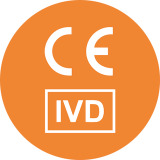We help families get clear insights into their incoming baby's health
Why NIPTIFY?
EARLY
RELIABLE
INNOVATIVE






SAFE
COMPREHENSIVE
SECURE
What does NIPTIFY provide?

Five most common chromosomal diseases
- Down syndrome
- DiGeorge syndrome (microdeletion)
- Edwards syndrome
- Turner syndrome
- Patau syndrome

Microdeletions and microduplications
18 carefully chosen genomic regions are involved in the analysis. The change in those regions may cause 20 chromosomal diseases altogether.
- Williams-Beuren syndrome
- 1p36 deletion syndrome
- Angelman and Prader-Willi syndrome
- Wolf-Hirschhorn syndrome
- Jacobsen syndrome
- Cri-du-chat or cat-cry syndrome
- Langer-Giedion syndrome
- And others. See the full list here

A large set of other conditions
- Trisomy 8
- Trisomy 9
- Trisomy 16
- Trisomy 22

Sex chromosome abnormalities
- Klinefelter syndrome (47,XXY)
- Jacobs syndrome (47,XYY)
- Trisomy X syndrome (47,XXX)

Mutations in mitochondrial DNA
Three mutations with applications in personalized medicine that help prevent hearing loss and deafness throughout a person's life. Read more HERE
- m1095T>C
- m1494C>T
- m1555A>G

Fetal sex
NIPTIFY determines the chromosomal sex of the fetus with 100% accuracy.

On average, there are five to ten microdeletions or microduplications affected kids per 10,000 newborns. NIPTIFY screens those related genomic regions to detect possible abnormalities in the early phase of pregnancy.
Choose the most suitable clinic for you to make an appointment with your obstetrician or midwife and perform the NIPTIFY test.
Niptify has a proven track record of accuracy and safety
We give parents peace of mind with a reliable, stress-free process that delivers clear insights into their baby’s health. Designed for accuracy and efficiency, it empowers families to make informed decisions with confidence and ease.
99.9%
Success rate
Unmatched Reliability – With a 99.9% success rate, the Niptify test ensures nearly all tests are successfully completed on the first attempt, offering peace of mind for expecting families.
99.9%
Test accuracy
Precision You Can Trust – Boasting 99.9% accuracy, Niptify delivers highly reliable results, empowering parents-to-be with confidence in critical health decisions for their baby.
0.6%
Need of retest
Exceptional Efficiency – Only 0.6% of tests require a retest, minimizing stress and delays, so families can focus on their exciting journey ahead.
NIPTIFY Live Statistics
No Data Found
-Show More
High-Risk Proportions
No Data Found
Positive Predictive Value (PPV)
No Data Found
PPV – the percent that a high-risk NIPT result is confirmed in the fetus by amniocentesis, ultrasound, or after birth.
SCA – Sex Chromosome Aneuploidies like 45,X; 47,XXY; 47,XYY or 47,XXX.
MDS – Microdeletions/Duplications/Segmental changes.
RAT – Rare Autosomal Trisomies like trisomy 16, trisomy 22, trisomy 9 etc.
The accuracy and broad scope of the NIPTIFY leave only one puzzle for future parents - “What name should we pick for our baby?“

Kaarel Krjutškov, PhD
CEO, Principal Inventor of NIPTIFYWhy should you choose NIPTIFY for microdeletion detection?
Why should you choose NIPTIFY for microdeletion detection?

NIPTIFY is a CE-IVD-validated and registered in vitro medical diagnostic device. The test can be distributed all over European Union.

The NIPTIFY medical laboratory has ISO 15189:2012 accreditation and follows the highest standards.

NIPTIFY participates in the EMQN ja GenQA quality assurance test and has consistently earned the highest possible scores.
TECHNOLOGY
NIPTIFY uses the modern Focus Plus DNA sequencing technology, which enriches fetal DNA. As a result, NIPTIFY analysis 3.6 times more fetal origin DNA than a regular NIPT test, increasing the accuracy and sensitivity.
Focus Plus technology is designed for routine and reliable screening purposes. The need for re-testing is close to zero, and the test is suitable for overweight patients.
